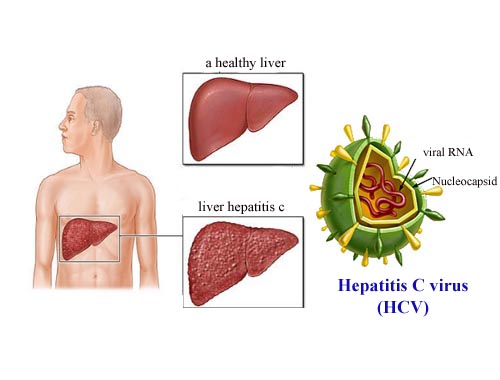Hepatitis C, HCV

Published: 18 Jun 2025
ICD9: 070.54 ICD10: B18.2 ICD11: 1E50.2
Hepatitis C (HCV) is a viral infection that primarily affects the liver.
It's a significant global health concern because it can lead to serious long-term complications if left untreated. Here's a breakdown:
Key aspects of Hepatitis C (HCV):
![]() Cause: It's caused by the Hepatitis C virus (HCV).
Cause: It's caused by the Hepatitis C virus (HCV).
![]() Transmission: HCV is mainly spread through blood-to-blood contact. Common ways it's transmitted include:
Transmission: HCV is mainly spread through blood-to-blood contact. Common ways it's transmitted include:![]()

![]() Sharing needles or syringes for injecting drugs (the most common route of transmission in many countries).
Sharing needles or syringes for injecting drugs (the most common route of transmission in many countries).![]()

![]() Blood transfusions or organ transplants before 1992 (when routine screening of the blood supply began).
Blood transfusions or organ transplants before 1992 (when routine screening of the blood supply began).![]()

![]() Needle-stick injuries in healthcare settings.
Needle-stick injuries in healthcare settings.![]()

![]() Mother to child during childbirth (vertical transmission, less common).
Mother to child during childbirth (vertical transmission, less common).![]()

![]() Sharing personal items like razors or toothbrushes (rare, but possible if blood is present).
Sharing personal items like razors or toothbrushes (rare, but possible if blood is present).![]()

![]() Less commonly, sexual contact, especially if it involves bleeding.
Less commonly, sexual contact, especially if it involves bleeding.
![]() Symptoms: Many people with acute (new) HCV infection have no symptoms or very mild, flu-like symptoms. This is why it's often undetected for years. When symptoms do appear, they can include:
Symptoms: Many people with acute (new) HCV infection have no symptoms or very mild, flu-like symptoms. This is why it's often undetected for years. When symptoms do appear, they can include:![]()

![]() Fatigue
Fatigue![]()

![]() Fever
Fever![]()

![]() Loss of appetite
Loss of appetite![]()

![]() Nausea
Nausea![]()

![]() Vomiting
Vomiting![]()

![]() Abdominal pain
Abdominal pain![]()

![]() Dark urine
Dark urine![]()

![]() Clay-colored stools
Clay-colored stools![]()

![]() Jaundice (yellowing of the skin and eyes)
Jaundice (yellowing of the skin and eyes)
![]() Chronic Infection: In most cases (75-85%), acute HCV infection becomes chronic. This means the virus persists in the body for the long term.
Chronic Infection: In most cases (75-85%), acute HCV infection becomes chronic. This means the virus persists in the body for the long term.
![]() Long-Term Complications (if untreated chronic HCV):
Long-Term Complications (if untreated chronic HCV):![]()

![]() Liver Cirrhosis: Scarring of the liver, which can impair its function.
Liver Cirrhosis: Scarring of the liver, which can impair its function.![]()

![]() Liver Failure: The liver can no longer perform its essential functions.
Liver Failure: The liver can no longer perform its essential functions.![]()

![]() Liver Cancer (Hepatocellular Carcinoma): Increased risk of developing liver cancer.
Liver Cancer (Hepatocellular Carcinoma): Increased risk of developing liver cancer.
![]() Diagnosis:
Diagnosis:![]()

![]() Antibody Test: A blood test to detect antibodies to the HCV virus. A positive antibody test means you've been exposed to HCV.
Antibody Test: A blood test to detect antibodies to the HCV virus. A positive antibody test means you've been exposed to HCV.![]()

![]() HCV RNA Test (Viral Load Test): If the antibody test is positive, an HCV RNA test is done to confirm active infection. This measures the amount of virus in the blood.
HCV RNA Test (Viral Load Test): If the antibody test is positive, an HCV RNA test is done to confirm active infection. This measures the amount of virus in the blood.
![]() Treatment:
Treatment:![]()

![]() Antiviral Medications: Highly effective direct-acting antiviral (DAA) medications are available that can cure HCV in most people (over 95%). Treatment is usually a course of pills taken daily for 8-12 weeks.
Antiviral Medications: Highly effective direct-acting antiviral (DAA) medications are available that can cure HCV in most people (over 95%). Treatment is usually a course of pills taken daily for 8-12 weeks.![]()

![]() Early Diagnosis and Treatment are Crucial: Treating HCV early can prevent serious liver damage and other complications.
Early Diagnosis and Treatment are Crucial: Treating HCV early can prevent serious liver damage and other complications.
![]() Prevention:
Prevention:![]()

![]() Avoid sharing needles or syringes.
Avoid sharing needles or syringes.![]()

![]() Practice safe sex.
Practice safe sex.![]()

![]() Ensure proper sterilization procedures are followed in healthcare settings, tattoo parlors, and piercing studios.
Ensure proper sterilization procedures are followed in healthcare settings, tattoo parlors, and piercing studios.![]()

![]() Screening of blood donations.
Screening of blood donations.
![]() Importance of Testing: People at higher risk for HCV infection should be tested, even if they have no symptoms. Risk factors include:
Importance of Testing: People at higher risk for HCV infection should be tested, even if they have no symptoms. Risk factors include:![]()

![]() Past or current injection drug use.
Past or current injection drug use.![]()

![]() Received a blood transfusion or organ transplant before 1992.
Received a blood transfusion or organ transplant before 1992.![]()

![]() Born between 1945 and 1965 (this group has a higher prevalence of HCV due to factors in the past).
Born between 1945 and 1965 (this group has a higher prevalence of HCV due to factors in the past).![]()

![]() HIV infection.
HIV infection.![]()

![]() Hemodialysis.
Hemodialysis.![]()

![]() Born to a mother with HCV.
Born to a mother with HCV.![]()

![]() History of incarceration.
History of incarceration.
In summary: Hepatitis C is a serious liver infection that can be cured with modern antiviral medications. Testing and treatment are essential to prevent long-term complications. If you think you may be at risk, talk to your doctor about getting tested.